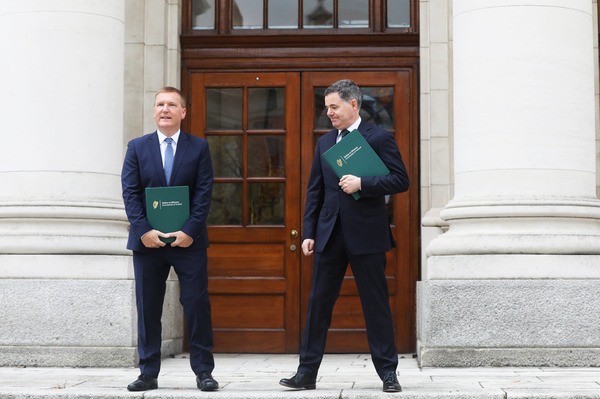Flush with tax from American technology and pharmaceutical companies, the most telling thing about budget 2023 was what the ministers decided not to do. The budget showed the limits of a finance minister’s power.
The first limit is the familiar one: the state has to tax before it can spend. Ballooning corporation tax receipts have made this less salient in 2023. The ministers were able to cut tax freely while they spent freely. But there are other limits.
The second limit is the nature of corporation tax receipts. Minister for Finance Paschal Donohoe says €8-€10 billion comes from the ten largest corporate taxpayers. Most of those are American companies, most of them are in the technology industry. The risk is that a change in American tax law, or a slowdown in the technology industry, could pull the rug out from under the public finances.
The budget ministers have decided that’s €8 billion they can’t responsibly spend. At least, it’s not money they can’t commit to spending year-in-year-out. Instead, they have decided the money should be invested.
The third limit is how quickly money can be invested into the Irish economy.
Ireland is a country with infrastructure problems. Housing is the obvious one, but there are others. The population has grown exceptionally quickly by European standards and is forecast to grow exceptionally quickly by European standards. We need more and better infrastructure.
I asked Minister Michael McGrath about this during the week. His point was that improving infrastructure is not simply a matter of spending more money:
“My experience over the last two years has been that some departments have really struggled to spend their capital budget. Year to date, we are in the order of €800 million underspent,” he said.
The bottleneck, the minister said, is not money. It’s the state’s ability to get things done in the real world: “It is about capacity — Not just public service capacity, but capacity across the private economy as well.”
From the minister’s perspective, pumping an extra €8 billion into the National Development Plan wouldn’t result in €8 billion more infrastructure. It would be underspend, or misspent.
Ireland is in the fortunate position of having had healthy public finances for most of the last 25 years. Ireland has been in a position to throw money at its problems.
Not all problems can be fixed with money. The ones we’re left with are knotty and deep-rooted. Take housing. The cost of building a home has risen between 70 and 90 per cent since 2007, according to research by Ronan Lyons. That’s a huge headwind for new housing supply. Throwing money at housing won’t resolve high construction costs. It will only make them worse. And more money won’t resolve bottlenecks in the planning system.
When it comes to the green transition, again, the bottleneck is not money. Investors are queuing up to back Irish wind farms. The bottleneck is the availability of suitable sites, and the planning system that controls that availability.
The bottleneck in the health system is not money. Measured as a percentage of national income, Irish health spending is right up there with the best systems in the world. Outputs are harder to measure, but it’s fair to say we do worse than our spending would indicate.
When it comes to transport infrastructure, the bottleneck is not money. Two weeks ago, Sean addressed this question on The Currency podcast with Marco Chitti. Chitti is a researcher who compares the way different countries deliver transport infrastructure projects. He talked about English-speaking countries’ inability to build transport infrastructure cheaply. He said:
“One of the big reasons costs are very high in the Anglosphere is that state capacity was emptied out in the 80s and 90s. Everything has been outsourced to the private sector. So everything is done by external consultants. There is a lot of this in the government sector. They have too many managers. Instead of engineers, they have many people that are just good at processes.”
Maybe Ireland’s fascination with the budget is a holdover from straitened times, years ago, when money truly was the bottleneck. Back then the limit was how much money could be raised in tax, and how much the financial markets were willing to lend the state.
But times have changed. Our most pressing problems can’t be solved on budget day.
*****
Elsewhere this week, I interviewed Paschal Donohoe, the Minister for Finance. It was an honest and frank conversation, where he addressed the learnings and lessons from his years in government. He talked about governing in a time of multiple crises, the future of the taxation system and much more besides.
Thomas interviewed the Minister for Environment, Climate and Communications, and for Transport, Eamon Ryan. Ryan’s wide brief takes in some of the areas most stressed by volatile energy markets. He told Thomas how he intends to capitalise on the situation.
Sean wrote about Ireland’s budget conundrum, in which any effort to improve people’s lot has the effect of exacerbating the housing crisis.
Stephen wrote about the idea of vision: the budget contained solutions to our short-term problems. But it didn’t pay much attention to the long term.
We had a lot of non-budget pieces also. Tom interviewed Declan Murphy of Allsorter. The company provides AI bias and compliance technology for hiring, and Murphy believes it can be a billion-dollar business. But to understand his plans for the future, you must understand the various turning points in his past.
Intense discussions are continuing to decide how international principles agreed at OECD-sponsored tax negotiations will be implemented, and the devil is in the detail. Thomas had the story.


